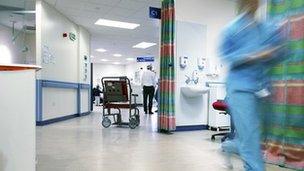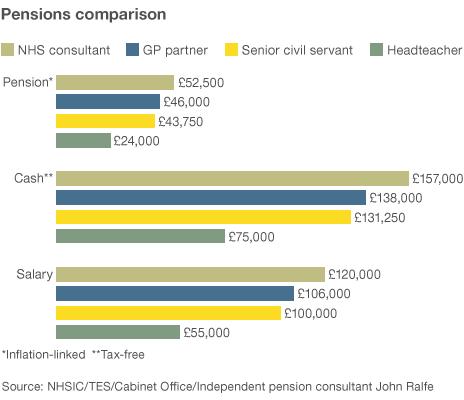Disruption to patients 'more limited than feared'
- Published

Ministers want to make doctors work for longer and contribute more to their pensions
Patients have had appointments and surgery cancelled due to industrial action by doctors but the total impact appears more limited than feared.
British Medical Association members across the UK have been boycotting non-urgent care in a dispute over pensions.
The government said NHS figures suggested 10% of hospital patients in England had had care cancelled, while a quarter of GP practices were affected.
But the union said the intention of the day was never to maximise disruption.
In the lead-up to the day of action, the BMA leadership was always clear that doctors would turn up for work and ensure emergency and urgent services would run.
This has meant that GP surgeries, A&E units and maternity departments were always going to remain open while tests for conditions such as cancer would still take place.
Warnings
But as the day of action has progressed it has become clear many doctors have also carried on seeing non-urgent patients - in fact the government said it believed only 8% of doctors took part.
It said the impact of this in England was that 2,700 non-emergency operations had to be cancelled and nearly 19,000 hospital appointments were put back - which in both cases amounts to a tenth of the workload.
About 2,000 GP surgeries - a quarter of the total - also took part by seeing only patients with urgent illnesses or injuries.
The government figures are supported by <link> <caption>information released by local NHS trusts.</caption> <url href="http://www.bbc.co.uk/news/health-18531285" platform="highweb"/> </link>
Birmingham's Queen Elizabeth Hospital has only cancelled three out of 100 non-emergency operations and 38 out of 2,000 routine appointments.
In Northamptonshire eight out of 10 surgeries were offering normal or near-normal services.
One in 10 operations have been hit at the Norwich and Norfolk Hospital and 71 out of 1,400 routine appointments.
Barnsley Hospital has cancelled eight operations and a quarter of outpatient appointments.
Across London nearly 500 operations have been cancelled - 10% of the total - while one in 10 appointments have had to be rearranged.
Elsewhere in the UK, the number of hospital cancellations was similar.
However, in Scotland more GP practices seem to have been affected with the government saying about 60% of centres took part.
But the BMA warned that the government figures needed to be treated with caution.
It said feedback from its members suggested that there was greater disruption with up to a quarter of non-urgent care affected.
Nonetheless, the picture contrasts with warnings from Health Secretary Andrew Lansley in the lead-up to the action.
He said many of the 30,000 non-emergency operations, including knee and hip operations, 200,000 hospital appointments and 1.25m visits to GP surgeries in England could be hit.
But patients who have been affected were angry.
Mark Catterall, from Poole, Dorset, told the BBC: "I've had an operation cancelled and now it looks like it will be August at the earliest.
"I think they [doctors] live in a bubble and really need to look at the bigger picture."
Argument
Mr Lansley said doctors had been wrong to "penalise" patients.
But he added: "In the run-up to these strikes our objective has been to minimise disruption for patients.
"We asked doctors to recognise that their quarrel was not with patients but with the government.
"I am pleased that a significant majority of doctors have done just that and maintained services for their patients."
BMA chairman Dr Hamish Meldrum said the action should not be judged solely on the impact felt by patients - because it fell short of a full strike.
"It has never surprised me that when it came to the crunch a lot of doctors do not want to take this out on patients."
The BMA has argued the government is wrong to try to change the current arrangements because a new deal was only agreed in 2008.
It has pointed out that the current scheme is bringing in a surplus of £2bn a year and under the new plans they are being asked to contribute much more than other high earners in the public sector.
Under the plans, doctors will be asked to work for longer - until 68 - and contribute more of their pay.
But ministers have insisted the changes, which apply to England and Wales but could be introduced elsewhere in the UK, are necessary.

- Published21 June 2012
- Published21 June 2012
- Published21 June 2012
- Published30 May 2012
- Published31 May 2012
- Published30 May 2012
- Published8 December 2011
- Published9 February 2012
- Published10 March 2011
- Published6 October 2010